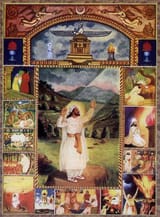Search Results
7/9/2025, 10:40:11 AM
>>509904376
>The Persians were followers of the religion of Zoroastrianism, founded by Zarathustra, or Zoroaster to the Greeks, which also emerged in the sixth century BC, and which exercised a formative influence on many of the philosophical and religious systems of antiquity, including Judaism, Christianity and Islam. The exact date of Zoroaster’s mission though is unknown. He was thought by the Greeks to have lived several thousands of years before the fall of Troy, but according to Zoroastrian accounts he flourished “ years before Alexander.” Alexander conquered Persia in 330 BC. Therefore, Zoroaster’s birthdate would have been 628 BC, if, as according to tradition, he was forty years old when he converted the king Vishtaspa, in 588 BC. It was then that he had received a vision from Ahura Mazda, the Wise Lord, who appointed him to preach the truth, but he was apparently opposed at first by the religious authorities in the area in which he preached. However, after the conversion of Hystaspes, Darius’ father, he remained at the king’s court, and other officials were converted
>Zoroastrianism is believed to have been originally monotheistic, but to have later been modified by its priests, the Magi. Thus, while most religions posit the existence of an evil principle inferior to the good God, Zoroastrianism became the origin of a type of dualism wherein evil is elevated to the rank of a god, equal but opposite to the good, both existing eternally at war with each other. One is Ahura Mazda, the God, lord of goodness and of light. The other is Ahriman, the Destructive or Tormenting Spirit, lord of evil and darkness. According to Diogenes Laertius, Greek scholar of the third century AD, “Aristotle in the first book of his work On Philosophy says that the Magi are more ancient even than the Egyptians, and that according to them there are two first principles, a good spirit and an evil spirit, one called Zeus and Ahura Mazda, the other Hades and Ahriman.”
>The Persians were followers of the religion of Zoroastrianism, founded by Zarathustra, or Zoroaster to the Greeks, which also emerged in the sixth century BC, and which exercised a formative influence on many of the philosophical and religious systems of antiquity, including Judaism, Christianity and Islam. The exact date of Zoroaster’s mission though is unknown. He was thought by the Greeks to have lived several thousands of years before the fall of Troy, but according to Zoroastrian accounts he flourished “ years before Alexander.” Alexander conquered Persia in 330 BC. Therefore, Zoroaster’s birthdate would have been 628 BC, if, as according to tradition, he was forty years old when he converted the king Vishtaspa, in 588 BC. It was then that he had received a vision from Ahura Mazda, the Wise Lord, who appointed him to preach the truth, but he was apparently opposed at first by the religious authorities in the area in which he preached. However, after the conversion of Hystaspes, Darius’ father, he remained at the king’s court, and other officials were converted
>Zoroastrianism is believed to have been originally monotheistic, but to have later been modified by its priests, the Magi. Thus, while most religions posit the existence of an evil principle inferior to the good God, Zoroastrianism became the origin of a type of dualism wherein evil is elevated to the rank of a god, equal but opposite to the good, both existing eternally at war with each other. One is Ahura Mazda, the God, lord of goodness and of light. The other is Ahriman, the Destructive or Tormenting Spirit, lord of evil and darkness. According to Diogenes Laertius, Greek scholar of the third century AD, “Aristotle in the first book of his work On Philosophy says that the Magi are more ancient even than the Egyptians, and that according to them there are two first principles, a good spirit and an evil spirit, one called Zeus and Ahura Mazda, the other Hades and Ahriman.”
Page 1
